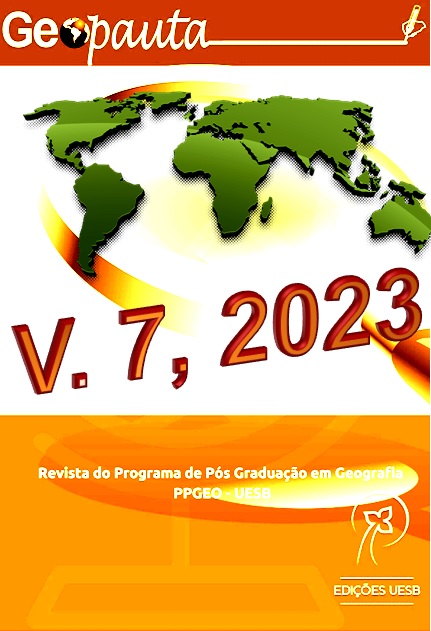The temporary labour in the coffee growing of the Planalto da Conquista in the decades of 1970 and 1980
DOI:
https://doi.org/10.22481/rg.v7.e2023.e12880Keywords:
Temporary labour, Coffee farming, Planalto da Conquista, Workers.Abstract
This text consists of the analysis of temporary labour in the coffee plantations of the Planalto da Conquista in the 1970s and 1980s. It also aims to explain theoretically how temporary labour was constituted with the advance of capitalism in the countryside and present some characteristics of this labour modality giving voice to workers who would experience the intermittency of labour in the region. In addition to a bibliographic review by authors such as Singer (1977), Bastos and Gonzales (1977), D'incao (1984), among others, field research was also used, which was fundamental for collecting testimonials from people who experienced these changes and who were subjected to temporary labour in coffee farms in the Planalto da Conquista.
Keywords: Temporary labour, Coffee farming, Planalto da Conquista, Workers.
Downloads
Metrics
References
BASTOS, M. I.; GONZALES, E. O trabalho volante na agricultura brasileira. In: Capital e trabalho no campo [por] Paul Singer [e outros] organizado por Jaime Pinsky. São Paulo, Hucitec, 1977. (Coleção estudos brasileiros, 7);
BARRETO, V. S. de S. O impacto social da lavoura cafeeira na Bahia: relatório de pesquisa. Salvador: SUDENE; SUTRAB, 1981;
CRISTO, K. K. V. Trabalho escravo rural contemporâneo, superexploração extremada, latifúndio e Estado. Dissertação de Mestrado em Política Social da Universidade Federal do Espírito Santo. Vitória. Outubro de 2008;
D’INCAO, M. C. A questão do Boia-fria. São Paulo: Brasiliense, 1984;
HARVEY, D. Condição Pós-Moderna. 13 ed. São Paulo: Edições Loyola, 2003;
MATIELLO, J. B. Tributo à tecnologia. Clube de tecnologia cafeeira. Folha 136. 1991. Fundação Procafé. Procafé online;
MENEZES, S. O. De “supérfluos” à sujeitos históricos na contramão do capital: a Geografia do (des)trabalho. São Cristóvão, SE, 2007. Núcleo de pós-graduação em geografia – NPGEO;
OLIVEIRA, A. U. de. Geografia agrária: perspectivas no início do século XXI. In: OLIVEIRA, Ariovaldo Umbelino; MARQUES, Marta Inês. (Orgs). O campo no século o território de vida, de luta e de construção de justiça social. São Paulo: Casa Amarela, 2004. p. 29-70;
SANTANA JUNIOR, I. M. de. A economia cafeeira e seus reflexos socioeconômicos no Planalto da Conquista – Bahia. Dissertação apresentada ao Curso de Mestrado em Desenvolvimento Regional e Urbano da Universidade Salvador - UNIFACS, Laureate Internacional Universities, 2012;
SILVA, M. A. de M. Errantes do Fim do Século. São Paulo: Fundação Editora da UNESP, 1999, Prismas;
SINGER, P. Capital e trabalho no campo [por] Paul Singer [e outros] organizado por Jaime Pinsky. São Paulo, Hucitec, 1977. (Coleção estudos brasileiros, 7);
SOUZA, S. T. Da negação ao discurso “hegemônico” do capital à atualidade da luta de classes no campo brasileiro. Camponeses em luta pelo/no território no sudoeste da Bahia. Tese (Doutorado em Geografia). São Cristóvão: UFS – NPGEO, 2008;
Downloads
Published
How to Cite
Issue
Section
License
Copyright (c) 2023 from the Geopauta Journal and the Author(s)

This work is licensed under a Creative Commons Attribution 4.0 International License.
Copyright
Authors must retain unrestricted copyright and grant the Geopauta the first publication with the work simultaneously licensed under CC BY which allows others to share with recognition of each author's authorship in the initial publication in this Journal
Intellectual Property and Terms of Use
Geopauta adopts the Free Access policy in accordance with Open Access - OAC recommended by DOAJ and in accordance with the SciELO Criteria, under a Creative Commons CC By Attribution 4.0 International License, allowing immediate free access to the work and allowing any user to read, download, copy, distribute, print, search or link to the full texts of the articles, track them for indexing, pass them as data to software or use them for any other legal purpose.
Geopauta attributes the CC BY. license. where it is allowed without restrictions:
Share — copy and redistribute the material in any medium or format for any purpose, even commercial. as long as they give due credit for the original creation.
Adapt — remix, transform, and create from the material for any purpose, even commercial purposes, as long as due credit is given for the original creation.












